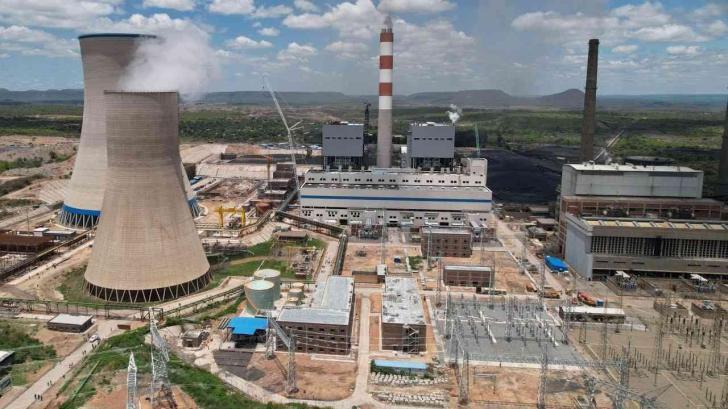News / National
Hwange's Unit 7 reconnected, boosting Zimbabwe's power capacity
03 Nov 2024 at 10:04hrs |
14 Views

In a significant boost to Zimbabwe's electricity generation, Hwange Thermal Power Station's Unit 7 was reconnected to the national grid on Friday, adding an additional 300 megawatts (MW) to the country's power capacity. The reconnection follows the completion of scheduled maintenance on Unit 7, which had left Unit 8 as the primary power source at the station for the past month.
The downtime of Unit 7, coupled with lower output from Kariba South Power Station, had led to increased load-shedding across Zimbabwe in recent months. With both units now operational, Energy and Power Development Minister Edgar Moyo expressed optimism about a reduction in load-shedding as the festive season approaches.
"We expect load-shedding to ease as we head into the festive season," Minister Moyo stated, noting that the reintroduction of Unit 7 would help alleviate some of the strain on the grid. He also mentioned that Unit 8 is scheduled for Class C maintenance early next year, in January or February, which should help maintain stable power supply in the interim.
Load-Shedding Relief Expected for Festive Season
Minister Moyo added that with most industries closing during the holidays, the reduced industrial power demand will allow more electricity to be allocated to residential areas, further alleviating load-shedding.
"With the reconnection of Unit 7 and the reduced industrial activity over the festive season, we expect most of the power to be directed towards domestic users," he said.
Power Generation and Ongoing Refurbishments
Recent power shortages were intensified by refurbishment projects at Hwange's older units, as the Zimbabwe Power Company (ZPC) continues work on six units using a US$300 million loan from the Export-Import Bank of India. These upgrades aim to improve the long-term reliability and efficiency of Zimbabwe's largest thermal power station.
As of last Friday, Zimbabwe's power output stood at approximately 866MW, with Hwange contributing 639MW, Kariba South Power Station generating 184MW, and independent power producers adding 43MW. However, the nation's peak demand of 1,800MW leaves a notable shortfall, which has led Zimbabwe to import electricity from neighboring countries to close the gap.
Despite challenges stemming from the El Niño-induced drought affecting Kariba's hydropower output, the synchronisation of Hwange's new units has allowed Zimbabwe's daily generation to average between 800MW and 1,000MW.
This increased capacity, combined with additional imports, is expected to provide Zimbabweans with a more stable power supply in the coming months, easing the energy challenges that have impacted both residential and industrial users across the country.
The downtime of Unit 7, coupled with lower output from Kariba South Power Station, had led to increased load-shedding across Zimbabwe in recent months. With both units now operational, Energy and Power Development Minister Edgar Moyo expressed optimism about a reduction in load-shedding as the festive season approaches.
"We expect load-shedding to ease as we head into the festive season," Minister Moyo stated, noting that the reintroduction of Unit 7 would help alleviate some of the strain on the grid. He also mentioned that Unit 8 is scheduled for Class C maintenance early next year, in January or February, which should help maintain stable power supply in the interim.
Load-Shedding Relief Expected for Festive Season
Minister Moyo added that with most industries closing during the holidays, the reduced industrial power demand will allow more electricity to be allocated to residential areas, further alleviating load-shedding.
"With the reconnection of Unit 7 and the reduced industrial activity over the festive season, we expect most of the power to be directed towards domestic users," he said.
Power Generation and Ongoing Refurbishments
Recent power shortages were intensified by refurbishment projects at Hwange's older units, as the Zimbabwe Power Company (ZPC) continues work on six units using a US$300 million loan from the Export-Import Bank of India. These upgrades aim to improve the long-term reliability and efficiency of Zimbabwe's largest thermal power station.
As of last Friday, Zimbabwe's power output stood at approximately 866MW, with Hwange contributing 639MW, Kariba South Power Station generating 184MW, and independent power producers adding 43MW. However, the nation's peak demand of 1,800MW leaves a notable shortfall, which has led Zimbabwe to import electricity from neighboring countries to close the gap.
Despite challenges stemming from the El Niño-induced drought affecting Kariba's hydropower output, the synchronisation of Hwange's new units has allowed Zimbabwe's daily generation to average between 800MW and 1,000MW.
This increased capacity, combined with additional imports, is expected to provide Zimbabweans with a more stable power supply in the coming months, easing the energy challenges that have impacted both residential and industrial users across the country.
Source - The Sunday Mail
Join the discussion
Loading comments…





































